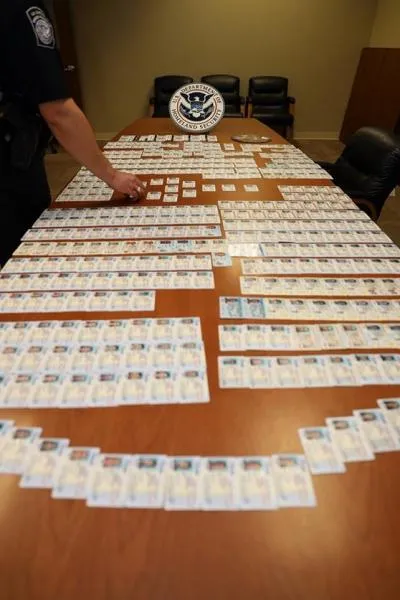Agency noted an uptick in fraudulent documents

counterfeit driver's licenses in the last 18
months.
DALLAS – U.S. Customs and Border Protection officers working at the Dallas Fort Worth port of entry have continued to intercept a growing number of counterfeit driver’s licenses hidden within the contents of packages arriving through international cargo.
In the last six months, CBP officers at DFW intercepted nearly 900 counterfeit driver’s licenses that were delivered via international shipping services to the Dallas area. Approximately 2000 fake IDs have been seized over the last 18 months.
When international cargo arrives to the U.S., officers perform an examination. During these examinations, CBP officers have been discovering fraudulent licenses hidden within larger items contained in the packages.
“What is most disconcerting about theses interceptions, besides the volume in which we are experiencing, is the ease in which so many young people freely share their personal information with counterfeiters abroad,” said CBP Port Director Timothy M. Lemaux, Area Port of Dallas. “We’ll continue to collaborate with local law enforcement to educate the public, and anyone who is contemplating purchasing a counterfeit ID online, on the potential dangers of sharing your personal identifiable information with a criminal element.”
In an effort to educate area college students, CBP officers teamed up with local area law enforcement and local universities to bring awareness about the dangers of providing their Personal Identifiable Information online to counterfeiters abroad for the benefit of a “Fake ID.”
“CBP enforces laws and regulations on behalf of more than 40 separate federal agencies and our officers are tasked, trained and given all resources to identify the illicit shipments from the legitimate ones,” said CBP Chief of Cargo Operations Raul Orona. “Thankfully, we’re able to leverage technology in our fight and ensure that the proceeds for these illicit shipments are not possibly funding criminal or terrorist organizations.”
All of the counterfeit driver’s licenses were seized and, depending on the circumstances surrounding the seizure, efforts were made to contact the recipients in an effort to make them aware of the inherent dangers involved in counterfeiting.

